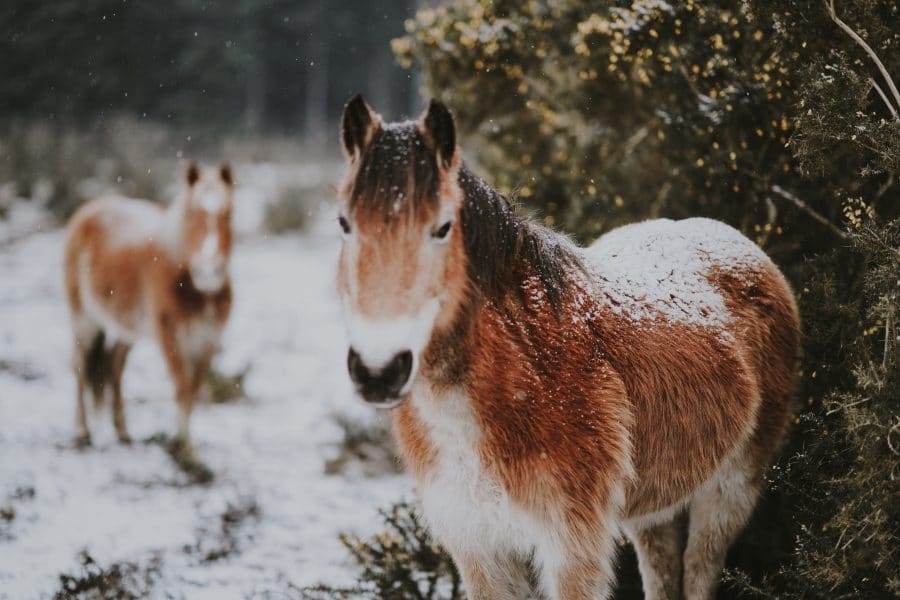Hacking out Safely in Winter
In the past 100 years roads have switched from primarily carrying four-legged traffic, to four-wheeled. Hacking out on public roads is always seen as comparatively…

In the past 100 years roads have switched from primarily carrying four-legged traffic, to four-wheeled. Hacking out on public roads is always seen as comparatively dangerous as on busy routes drivers typically don’t expect to see horses, whereas quieter roads are often wigglier, and the speed limit set at 60mph.
As winter fast approaches hacking out only becomes more hazardous, and it’s important you take measures to reduce your risk of being involved in an accident; here are several tips to get you started.
Continue to work your horse
For many of us, winter means fewer opportunities to exercise our horses, and is largely the reason that hacking comes to the forefront of many riders’ routine. A lack of exercise often leads to your horse becoming overly fresh, ultimately increasing the risk of an accident on the road. So, in our opinion it’s vital you keep your horse in the best condition possible, not only for your horse’s sake, but yours also. Lunging before riding is a great way to decrease your horse’s energy levels, as well as acting as an effective warm-up.
Timing is key
Whereas leaving your yard on a ride at 1900 in the peak of summer was fine, in the depths of winter this is far from the case. Before setting out ensure you have enough time to deal with any reasonable hiccup you might encounter, such as a loose shoe. Also, make sure you’re familiar with the route you’re taking, as it may take longer than you expected leaving you riding in the dark. If you’re unsure, the BBC Weather app (Web, Android, and iOS) offers sunrise and sunset times, but act on these insights with caution.
Know your route
As well as knowing how long the route is going to take to complete, familiarise yourself with any hazards that may develop. For example, areas that may become slippery with ice, or dangerously boggy with increased rain. This extends to knowing peak traffic times – a great way to reduce your risk (see Traffic England, or Traffic Wales for more information).
Shoes
To help prevent your horse from slipping discuss fitting winter studs with your farrier. In snowy conditions snow is prone to building up inside of your horse’s hoof – a time-honoured method to prevent balling is to apply Vaseline.
Keeping warm
Make sure your horse is adequately rugged using a well-fitting exercise blanket. This is important from both a welfare point of view, as well as safety – if your horse is uncomfortable it is less likely to respond to your command.
It’s important not to overlook your well being as a rider, and the effect it can have on your safety. Invest in a good set of riding gloves, as they help to compensate for reduced grip in wet weather (using rubber grip reins helps, also). Similarly, purchase a coat that’s not only going to keep you warm, but also dry.
Visibility
This is likely teaching your grandmother to suck eggs, but make sure you and your horse are visible to other road users; the best way to be seen is with hi-vis clothing and riding gear – available for both rider and horse.
Many riders like to ride two abreast to increase their road presence, or to protect less confident horses. However, the British Horse Society have previously stated that ~75% of all road accidents are due to drivers not leaving enough room when passing. For this reason, in some instances you might feel more comfortable riding in single file to increase the amount of room available to drivers for overtaking. As always, use your own common sense and source a second opinion if required.
Know what to do
If the worst happens, and you’re involved in an accident with a motor vehicle note down the number plate of all of the vehicles involved – including any witnesses – and get the drivers details. You should report the incident to both your insurance company and the police. Also, consider writing an account of what happened while you remember the intricacies so that you can call upon it later, should it be required.
As always, if you’re hacking out alone tell someone you trust the route you’ll be taking, and when you expect to be back, and ALWAYS have liability cover.